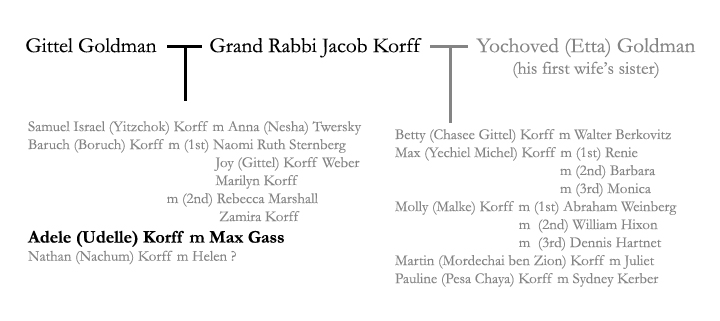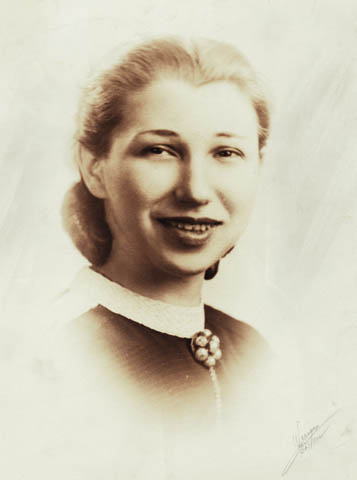
|
Adele Korff Gass:
Growing Up in America, Courtship and Marriage
|
|

|
|
 |
|
These undated photographs of Adele show her before she married Max. They were apparently taken the same day. Note that her collar in both pictures is the same. |
|
Adele Korff Gass was born in 1918 in Novograd-Volynsk, Russia (called Zvil by its Jewish population), the third of four children, and the only girl, born to Grand Rabbi Jacob Korff and Gittel Goldman. In 1919, when the youngest child, Nahum was still an infant, Gittel fell victim to a marauding Ukrainian in a pogrom. The children were now without a mother and their father was without a wife. A year after his wife’s murder, Rabbi Korff married his sister-in-law, Yochoved (Etta) Goldman. In 1922, Etta gave birth to a daughter, Betty, the first of five children from that marriage. Max was born two years later in Poland. In 1927, Rabbi Korff moved his family to the United States, settling in Dorchester, Massachusetts, and within three years Molly, Martin, and Pauline were born.
As the daughter of a renowned rabbi, Adele’s life was not her own. In a series of interviews in the early 1990s Adele shared her recollections:
“When I was child I was treated differently. If I went to a movie and it wasn't just so, a self-appointed committee of women would complain to my father that I went to a movie that wasn't befitting a rabbi's daughter. Once a year, we had the Zvil Ball and I always attended this dance. I was very popular, and a committee of women whose daughters weren't as popular would go to my father afterward and complain that I had behaved not like a rabbi's daughter. I had a friend who babysat, and what was wrong with her? She was a nemkama (a maid) and the committee complained that she was not a befitting companion for a rabbi's daughter. Finally, my father said to the meddlers, Adele may not have a mother but she still has a father.
 |
|
|
Click here to listen to Adele Korff Gass describe life as a rabbi’s daughter. |
“When I was about eleven or twelve I would sometimes go home with Mrs. Kaplan [the Korff’s live-in housekeeper] on weekends. Her husband lived in the West End. He abused her but not when I was there. She ended up in the hospital because he stabbed her. After she recuperated, she came back to us. Eventually Mrs. Kaplan left us permanently and we had a whole string of other housekeepers. They had difficultly getting along with my stepmother and so they never lasted long. When they left, I was stuck with the cooking.
“Mrs. Kaplan gave me my first introduction to womanhood. When I awoke on my 13th birthday I felt unwell and noticed I was bleeding. Terrified, I screamed for Mrs. Kaplan. She raced into my room, immediately assessed the situation, and slapped my face. Now you are woman, she said.”
Adele was ready for dating earlier than her father would have allowed but her friend, Mrs. Kaplan, gave her an alibi. According to Adele:
"My father never knew about my dating antics. Mrs. Kaplan, who liked me very much, covered for me. I used to sneak out at night through the synagogue window. My father would come into our rooms to check on us and Mrs. Kaplan would tell him I was asleep and not to disturb me. Meanwhile, I went to the homes of my girl friends and doubled dated with them. We'd go to the movies but not in Dorchester or Mattapan, not any place where anybody knew me. At the end of the date, I'd climb back into the house through the same window and then I'd tiptoe up the back staircase. This was radical behavior for the daughter of a grand rabbi--virtually unheard of. When my sister Molly was old enough, she sneaked out, too, but my sister Betty didn't.
“I was very popular. I wasn't that beautiful, but boys stuck to me like glue. I'd get rid of one boyfriend, and I'd get another one, and every one would propose marriage. “
Part of Adele’s popularity may have been due to the fact that she looked and acted older than she actually was. She recalled:
“I lied about my age. I always made myself two years older and I went out with men much older than myself. I was found out when my cousin threw me a sweet 16 party and all the Yeshiva boys who used to take me out realized how young I was. They stopped dating me. I had one persistent suitor, Rabbi Lipschitz. He followed me to Florida when I was taking care of my father who was ill. He followed me to New York. He promised me the moon.”
Adele broke the mold in other ways as well:
“I was a rebel. My father didn't believe in educating girls or allowing girls to work. He believed the role of the woman was to be a good mother and wife. I went to public school but I owned only two dresses. Each day I put one on and washed out the other. When I was 14 or 15, I took a job at Kolpuski's bakery. Early in the morning I would sneak out and show up for work at the bakery at six. I worked for a couple of years and nobody in my family found out. My father would have killed me. I gave the money to my brothers or I bought groceries. I didn't spend it on myself.”
Another way she rebelled was to marry a non-rabbi. It was a tradition among Hasidim to marry within the family--usually cousins--but Grand Rabbi Jacob Korff's daughter, Adele, had no intention of marrying a rabbi. She explained:
“As a rabbi’s daughter I had to be on my toes constantly. I told my father I would never marry a rabbi because being a rabbi's wife was just too restrictive. A rabbi's wife belongs to the public and I didn't feel that anybody had the right to judge me.”
And then fate lent a hand and Adele met Max Gass:
“One day when I was 16 and all dressed to go out, a Hebrew teacher named Mr. Dubrow came to our house. He was friend of our family and friend of the Gass family. Later that day at the Gass home in Chelsea, Dubrow said to Max Gass, I saw a girl who used to be just a kid, and now she's a beauty. Max asked for my phone number and called me for a date. He told me a friend of mine had given him my phone number.
|
|
|
Max Gass |
“You couldn't have gotten the number from any of my friends, I told him, because they all know I don't go out on blind dates.
“I turned him down, but he replied, I was told you were a good sport, but I guess I was told wrong.
“I hated to be called a bad sport. So I said, I tell you what. We'll both arrange dates for later in the evening. That way if I don't like you I can leave, and if you don't like me you can leave. It was the only way I would consent to meeting him. So we made a date.
“Max came over that evening with a big bag of peanuts. He came in, plunked himself down, and sat there eating the peanuts. He said, I like what I see. And he wouldn't let me go out on the other date.
“We went to the symphony and while we were sitting at a little table, he said to me, What color are your eyes?
“Brown, I answered.
“Will you marry me? he asked. He proposed on our first date.
“After that, he came over every day. If I went out with another man, when I returned Max would be sitting on the porch or waiting in his car for me. Each day he drove a different car. He used his sister's car, his brother-in-law's car, the factory car... I said to my father that Max must either be a crook, or he works in a garage and he's using the cars. After a few weeks of this, I told Max I didn't think I wanted to get married.
“A couple weeks passed and we didn't see each other. Then he called to tell me his grandfather [Kessel] had died. He said he felt low and couldn't I see him?
“When Max came to pick me up, he always entered the dining room and said hello to my father first. He would pick up one of the many books my father had out on the table and read from it, to impress him and show off his knowledge of Judaism. This happened over and over.